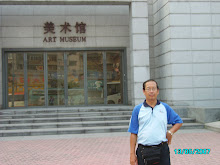The mandatory retirement age of public sector employees has been raised from 56 to 58 effective July 1 this year as part of several incentives announced yesterday by Prime Minister Datuk Seri Abdullah Ahmad Badawi.
One of the other incentives is the calculation of the pension based on a maximum of 30 years of service, up from the current 25 years, for all public employees effective January 1, 2009.
The derivative pension would be maintained at 100 per cent, also effective 1 January 2009, he said at the public sector Workers’ Day gathering at the Putrajaya International Convention Centre (PICC), here.
Abdullah also said that the contentious Efficiency Level Assessment (PTK) would not be abolished but the method of implementation would be improved from time to time.
The Prime Minister said that after considering the life expectancy of Malaysians, the government decided to raise the public sector retirement age.
“Based on a government study, raising the retirement age will not jeopardise the employment opportunities of fresh graduates.
“This is important as the new generation of public employees should not feel that their opportunities for career development are diminishing but rather increasing,” he said.
On the PTK, he said since 2003, the government had continued to improve the implementation of the assessment.
This included increasing the regularity of implementation to expedite the process of career development of officers.
He said that this year, the government agreed to make several improvements, such as:
Not using the PTK written test for Grade 1 to 16 officers.
The competency assessment boards of ministries, states and agencies would determine alternative methods, and
Reviewing and implementing in stages the method of implementation for officers in other grades.
On the derivative pension, Abdullah explained that current regulations stipulate that the derivative pension received by the next-of-kin would depreciate to 70 per cent of the total pension after a lapse of 12-1/2 years from the date of retirement or death in service of a public sector employee.
“Based on a study, this would pose a financial burden for the families with young children. To alleviate this burden, the government has agreed to abolish the depreciation of the derivative pension as of January 1, 2009, meaning that the pension will be paid 100 per cent to the next-of-kin,” he said.
Abdullah, who is also Finance Minister, said the government had also agreed to calculate the pension according to a formula based on a maximum of 30 years of service for all pensioners and pension recipients effective 1 Jan 2009.
Currently, the pension of public sector employees is calculated by taking into account a maximum of 25 years of service.
“This new policy also covers retirement and death in service prior to the implementation date. However, the recalculated pension will only be paid from January 1, 2009 without any arrears. Both these new policies governing pensions will incur an additional annual expenditure of RM718 million and will benefit about 310,000 pensioners and pension recipients,” he said.
Abdullah also said that the government had also agreed that the mother or father of an employee who dies and has no next-of-kin would be given one lump sum payment or ex-gratia payment and not a derivative pension.
The Prime Minister said the government was still studying the other demands, such as a review of the housing allowance and the absorption of contract employees into the permanent service, and would announce its decisions before the tabling of the 2009 national budget in parliament, scheduled for Aug 29.
Abdullah also urged public sector employees to give of their best to every assignment they were given.
“We cannot be lackadaisical towards directives but should have a sense of urgency to implement all decisions reached. Any decision or programme will be meaningless unless it is implemented well,” he said.
The Prime Minister also said public employees should set for themselves a high level of integrity because it was pointless to have mastery of knowledge without a good attitude.
“What I want to emphasise here is that the public service plays an important role in creating a conducive atmosphere for the country to be competitive and progressive. It is the public sector that will determine the success or failure of the country in its march towards Vision 2020,” he said.
— Bernama NEW RETIREMENT AGE NOT AUTOMATIC, says PSD chief Although the government has extended the mandatory retirement age from 56 to 58 years, it is not automatic, said Public Service Department director-general Tan Sri Ismail Adam.
“Civil servants have to individually agree that they want to continue serving until 58,” he told reporters after attending the public sector’s Workers’ Day gathering at the Putrajaya International Convention Centre (PICC) here yesterday.
He said this in response to Prime Minister Datuk Seri Abdullah Ahmad Badawi’s announcement yesterday of several incentives for public sector employees, the new retirement age, which will take effect from July 1, being one of them.
Others include the calculation of pension to be based on a maximum of 30 years of service, up from the current 25 years. This will be effective Jan 1 2009.
As for the derivative pension, it would be maintained at 100 per cent from Jan 1, 2009.
Ismail explained the Pensions Act stipulated that civil servants must be given the option to decide whether they wanted to continue their services up to the mandatory retirement.
“Under the Act, civil servants can go on optional retirement beginning 40,” he said. Touching on the calculation of pension based on a maximum of 30 years of service, up from the current 25 years, Ismail said it would benefit all pensioners.
“It is across the board. All pensioners will get it. Like me … when recalculated I do not get it now but in Jan 2009,” he said.
Describing it as a good move by the government, Ismail said currently, “the maximum pension you can get is only up to 25 years of service.”
“Now with five years added, you get extra when your calculate your pension,” he said.
Ismail said the total pension bill currently stood at RM5 billion and that the new incentives would incur an additional expenditure of RM781 million.
On the derivative pension that is to be paid 100 per cent to the next-of-kin after a lapse of 12-1/2 years from the date of retirement or death in service of a civil servant, Ismail said: “It is for both.”
“If the government servant is a woman the husband gets it, if it is a man then the wife gets it,” he said.
At the gathering, the prime minister also said that the government had agreed that the mother or father of a government employee who dies and has no next-of-kin, would be given one lump sum payment or ex-gratia payment.
Referring to this, Ismail said: “It is a gift from the government to the parents.
“It has never been done before but there is a formula for it … it depends on the length of service,” he said.
– Bernama





.jpg)
